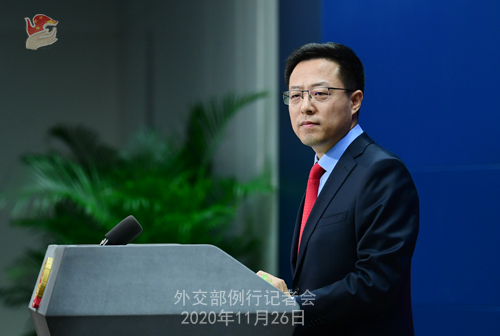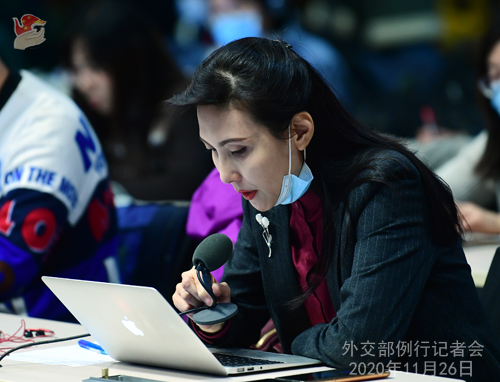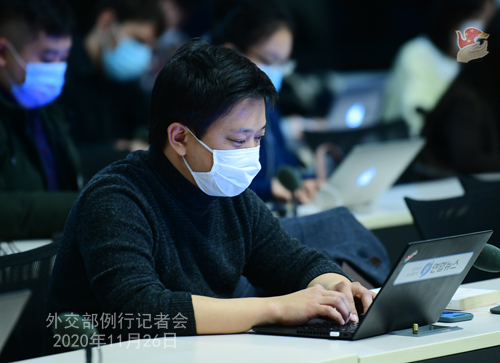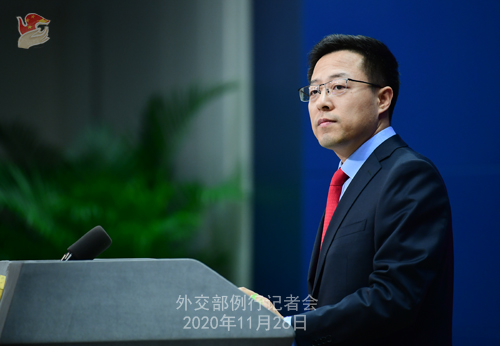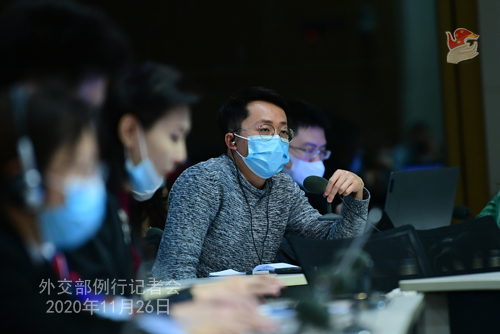| Foreign Ministry Spokesperson Zhao Lijian's Regular Press Conference on November 26, 2020 |
| 2020-11-26 18:56 |
|
I. Upon invitation, Premier Li Keqiang of the State Council will attend in Beijing the 19th Meeting of the Council of Heads of Government of Member States of the Shanghai Cooperation Organization (SCO) to be hosted through video link by India on November 30. II. As decided by both sides, Premier Li Keqiang will hold the 25th regular meeting between Chinese and Russian heads of government with Russian Prime Minister Mikhail Mishustin via videoconference on December 2. III. Yang Jiechi, Member of the Political Bureau of the CPC Central Committee and Director of the Office of the Foreign Affairs Commission of the CPC Central Committee, will attend events including the opening ceremony of the 17th China-ASEAN Expo and China-ASEAN Business and Investment Summit on November 27. CCTV: The foreign ministry announced today that President Xi Jinping will deliver a speech via videoconference at the opening ceremony of the 17th China-ASEAN Expo and China-ASEAN Business and Investment Summit, and Director Yang Jiechi will attend the ceremony. We noticed this is the first time that the Chinese president delivers a speech on such an occasion. What's China's expectation of the Expo and the Summit? Zhao Lijian: ASEAN is a priority in China's neighborhood diplomacy. Recent years have seen deepening China-ASEAN cooperation across the board and stronger China-ASEAN ties. Since the COVID-19 pandemic broke out, China and ASEAN countries have been working together to tide over difficulties, fight the virus and recover the economy. Against the special backdrop of the ongoing COVID-19, China is still hosting the China-ASEAN Expo and China-ASEAN Business and Investment Summit as scheduled and President Xi Jinping will deliver remarks by video link. This demonstrates our firm resolve to stay committed to higher level of opening up and advancing China-ASEAN economic and trade cooperation. This year marks the 10th anniversary of the full establishment of the China-ASEAN free trade area. Over the past decade, trade has doubled between China and ASEAN, growing from $292.8 billion in 2010 to $641.5 billion in 2019. In the first three quarters this year, two-way trade reached $481.8 billion, a 5% year-on-year increase, making ASEAN China's biggest trading partner for the first time. Economic and trade cooperation has contributed strongly to the prosperity of China and ASEAN. This period can be described as the "golden decade" in China-ASEAN economic and trade relations. The recently concluded fifth plenary session of the 19th Central Committee of the Communist Party of China reviewed and adopted proposals for the formulation of the 14th Five-Year Plan (2021-2025) for National Economic and Social Development and the Long-Range Objectives Through the Year 2035, and China will begin a new journey toward fully building a modern socialist country. We will stay committed to deepening reform and opening up and formulate a new development paradigm, where neighboring countries like ASEAN will be the first to benefit. Through the Expo and the Summit, China hopes to further deepen economic and trade cooperation with ASEAN, elevate relations to a new height, achieve new breakthroughs in regional economic integration, and forge ahead toward another golden decade.
Yonhap News: Reports say the Chinese and ROK foreign ministers held talks today. Can you give us more details on that? Zhao Lijian: State Councilor and Foreign Minister Wang Yi is visiting the Republic of Korea. We just published the press release of his talks with ROK Foreign Minister Kang Kyung-wha. I'll briefly talk about some key points. Fruitful outcomes were achieved during their talks, which can be concluded as consensus in ten aspects. First, the two sides will continue enhancing anti-epidemic cooperation and joint prevention and control, improve and gradually expand the application of the "fast track", and promote the building of a health and anti-epidemic cooperation mechanism in Northeast Asia. Second, the two sides decided to establish a committee for future development of China-ROK relations. The year 2022 will mark the 30th anniversary of diplomatic ties between China and the ROK. Taking it as an opportunity, we will draw blueprints for bilateral relations in the next three decades. Third, the two sides will launch 2+2 dialogue for diplomacy and security, initiate dialogue on maritime affairs, and hold a new round of high-level strategic dialogue between diplomatic agencies to enhance mutual trust in diplomatic and security spheres and advance cooperation in maritime affairs. Fourth, the two sides will start making arrangements for China-ROK culture exchange year in 2021 and 2022, and preparing for the commemorations of the 30th anniversary of diplomatic ties. Fifth, the two sides will accelerate dovetailing of the BRI and the ROK national development strategy, pursue third market cooperation, strengthen cooperation in key areas like emerging industries, and deepen quality integrated development of both countries. Sixth, the two sides will reach the phase two deal of the China-ROK free trade agreement as soon as possible, and roll out a joint roadmap for economic and trade cooperation (2021-2025) at an early date to create more enabling conditions for bilateral economic and trade cooperation. Seventh, the two sides will support each other in hosting the Beijing Winter Olympic Games and the Gangwon Winter Youth Olympic Games. Bilateral cultural and people-to-people exchange will be further encouraged after the pandemic is put under effective control. Eighth, the two sides will stay committed to safeguarding peace and stability on the Korean Peninsula and working for political settlement. China firmly supports the DPRK and the ROK in improving relations and promoting reconciliation and cooperation. Ninth, China supports the ROK in hosting the ninth trilateral summit meeting among China, the ROK and Japan. Both sides will work with Japan to advance talks on a trilateral free trade agreement. Tenth, the two sides will strive for the RCEP's early entry into force, uphold multilateralism and free trade, foster an open world economy, and jointly handle global challenges such as climate change. The two foreign ministers agreed to follow the strategic guidance of leaders of the two sides, strengthen communication, exchange, friendship and trust, deepen practical cooperation, and elevate China-ROK strategic cooperative partnership to a new height. China Daily: How does China see the development of the SCO and what expectations do you hold for this upcoming meeting of the council of heads of government? Zhao Lijian: Since its founding 19 years ago, the SCO has maintained a sound and stable momentum of development and successfully blazed a new path of cooperation and development for regional organizations. Against the backdrop of global disasters and epidemics interwoven with profound changes unseen in a century as well as complex and profound evolution of the international and regional landscape, the SCO has an even more important mission to safeguard regional security and stability and promote development and prosperity of all countries. Not long ago, the SCO video summit produced fruitful results. Leaders of the participating countries drew up a blueprint and charted the course for the Organization's development in the next stage. The upcoming meeting of heads of government is an important event under the SCO framework this year. At the meeting, Premier Li Keqiang and other leaders will hold in-depth communication and exchange on deepening SCO cooperation amid the pandemic, gather broader consensus on cooperation, formulate more practical measures to seek greater synergy between BRI cooperation and national development strategies and regional cooperation initiatives, enhance economic, trade, investment, production capacity, connectivity, cultural and people-to-people cooperation, boost national economic recovery, improve people's livelihood, and promote faster and better development of the SCO.
Xinhua News Agency: You just announced the 25th regular meeting between Chinese and Russian heads of government, which will be held by Premier Li and Prime Minister Mishustin. Can you tell us your expectations for this meeting? Zhao Lijian: China and Russia have been helping each other to fight the COVID-19 pandemic since it broke out, adding new dimensions to the China-Russia comprehensive strategic partnership of coordination for a new era. Bilateral cooperation has been steadily growing despite the pandemic. In the first ten months this year, bilateral trade reached $88 billion, with gradually smaller drop in volume. Trade in areas such as agriculture, energy and cross-border e-commerce actually increased against the odds. The China-Russia year of scientific and technological innovation has been smoothly launched, accumulating more positive elements in bilateral cooperation. The regular meeting between Chinese and Russian heads of government, which has been held 24 times, is an important mechanism for both sides to coordinate, plan for and guide practical cooperation and people-to-people exchange. The upcoming 25th regular meeting is a high-level interaction at a special moment with the ongoing COVID-19 pandemic and the world economy slipping into recession. It is of great significance for the two sides' joint efforts to coordinate and advance epidemic prevention and control as well as cooperation in various fields. It will inject stronger impetus into bilateral relations and the common development and revitalization of the two countries, and contribute the two sides' wisdom and strength to the global fight against COVID-19 and world economic recovery. Beijing Youth Daily: The China-Africa Environmental Cooperation Center has recently opened in Beijing. Could you share more details with us? How do you view the progress in China-Africa environmental cooperation and what does the future of such cooperation look like? Zhao Lijian: We announced the launch of the China-Africa Environmental Cooperation Center. I'd like to stress that it is another major achievement in the implementation of the outcomes of the 2018 FOCAC Beijing Summit. It will serve as a new platform for China-Africa dialogue on environmental policies, exchange and cooperation on environmental industrial and technology information, and joint research on environmental problems. China hopes this center, serving as a new platform, will help elevate bilateral exchange and cooperation while injecting new energy into the building of a China-Africa community with a shared future. Earth is mankind's only home. The Chinese and African people both yearn for a beautiful environment and a fulfilling life. Over the past two decades since the establishment of FOCAC, China and Africa have been deepening cooperation under this framework, including on environmental protection, climate change and green development. New cooperation plans and measures were adopted at every FOCAC meetings. At the 2018 FOCAC Beijing Summit, eight major initiatives were adopted, covering green development and other areas. Over the past two years or so, China and Africa carried out many cooperation programs on environmental protection, disaster prevention and mitigation, and clean energy. Remarkable progress has been made in the implementation of the outcomes. China-Africa cooperation has huge potential and bright prospect in ecological protection and green development. China is ready to continue working with Africa to pursue green, low-carbon, circular and sustainable development, protect the environment and all living creatures, and make both China and Africa a beautiful home for humankind and nature to co-exist in harmony.
Reuters: U.S. special envoy for Iran Elliott Abrams said on Wednesday that the United States will impose Iran-related sanctions on four entities including Chinese companies, whom it accused of supporting Iran's missile program. What's the foreign ministry's comment on this? Zhao Lijian: China has lodged stern representations with the US side over this. We firmly oppose unilateral sanctions and "long-arm jurisdiction" imposed by the US on other countries. We urge the US side to correct its mistake at once and withdraw the illegal sanctions. China remains committed to safeguarding the international non-proliferation regime and strictly fulfilling its international obligation on non-proliferation. At the same time, we will firmly defend our legitimate rights and interests. SCMP: Chinese President Xi Jinping on November 25 sent a message to congratulate Joe Biden on his election as president of the United States. I wonder if the Chinese side has established contact with Biden's team or if there is any plan to open channels of communication in the short term and hold consultations on growing bilateral relations? Zhao Lijian: Maintaining sound and stable development of bilateral relations serves the fundamental interests of the Chinese and American people, and also represents the shared aspiration of visionary people in the United States and the international community. China stands ready to work together with the United States to strengthen communication, focus on cooperation, manage differences in the spirit of non-conflict, non-confrontation, mutual respect and win-win cooperation to advance the sound and stable development of bilateral ties. YTN: I'd like to ask about the possibility of President Xi Jinping's visit to South Korea. Zhao Lijian: Head of state diplomacy, as the most important form of high-level exchange, plays an irreplaceable role in the development of bilateral relations. China and the ROK have been in close communication over exchange and cooperation in various fields including high-level interaction. Reuters: It has been reported that India's tight control of quality clearance at customs for electronic goods from China slowed the import of Apple's new iPhone model and held up other products including Xiaomi phones. Industry sources said it was related to recent political tensions. What's the foreign ministry's comment on this? Zhao Lijian: Yesterday I made clear China's position on India's practices. These practices, in glaring violation of market principles and WTO rules, severely harm the legitimate rights and interests of Chinese companies, and do no good to India's domestic investment and industries. China-India economic and trade cooperation is mutually beneficial by nature. We have been urging India to immediately correct its discriminatory approach and avoid causing further damage to bilateral cooperation. It should provide a non-discriminatory, level playing field for all foreign companies, including Chinese ones.
|
| |||||||||||||||
|
|||||||||||||||


